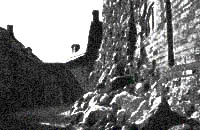|
Uwe Grossfleischer and the demolition of the Burg
In 1871 Philip van der Eenuck and Uwe Grossfleischer went public with the great Boulevard Plan,
that would change Scôz am Rhein forever.
At first Grossfleischer was a secondary figure, and van der Eenuck got all the credits.
But in 1874 van der Eenuck died, and Grossfleischer seized control over the enormous project.
A lot has been written about the mysterious death of Philip van der Eenuck. He was found drowned in the Rhein,
dressed in a womans dress, and most people believed that he had been murdered by Grossfleischer.
But the Burgmeister of the city refused to bring the matter to court,
publically stating that van der Eenuck's death was an "unfortunate accident".
Also the Grand Duke (who was a close friend of Grossfleischer) said no trial was needed,
and so the incident vanished into history as yet another "Scozer mystery".
|
|

|
Grossfleischer commissioned the demolition of the Burg in 1893.
The old castle had been abandoned for many years, and several small fires had gradually reduced parts of it to ruins.
But even as a ruin, people had strong feelings about it.
The famous suffragette Pomerance Klock started raising funds for preserving the Burg as a "Monument of Repression".
Others wanted to rebuild it as a factory, while most people wanted to keep it as a romantic ruin.
Grossfleischer couldn't care less. Even though Pomerance Klock offerered to buy the ruin from the State,
he had it firmly erased from the face of the Earth. But in honor of the Grand Duke, he named some streets after the old Burg.
Altze Wassergrabe showed where the old Moats used to be, and Altze Hôfer Strasse stretched over the old Courtyard.

|
|
The new buildings were designed by Otto von Mottke, including the lavish Hotel Grosz Scôz, in which some of the old castle dungeons were
preserved as winecellars.
Grossfleischer was often seen at the Cellar Restauarant, with his many young male friends.
Once a witness saw him cry over the fate of the old castle. He is said to have regretted the demolition, and
called himself "A fake without heart, a murderer without history".
Was he refering to the "killing" of the old Burg, or the mysterious death of his old partner?
We will never know.
|
|
|



